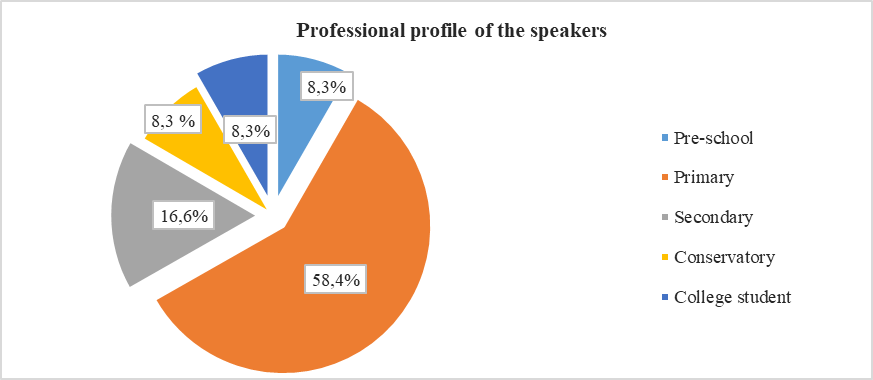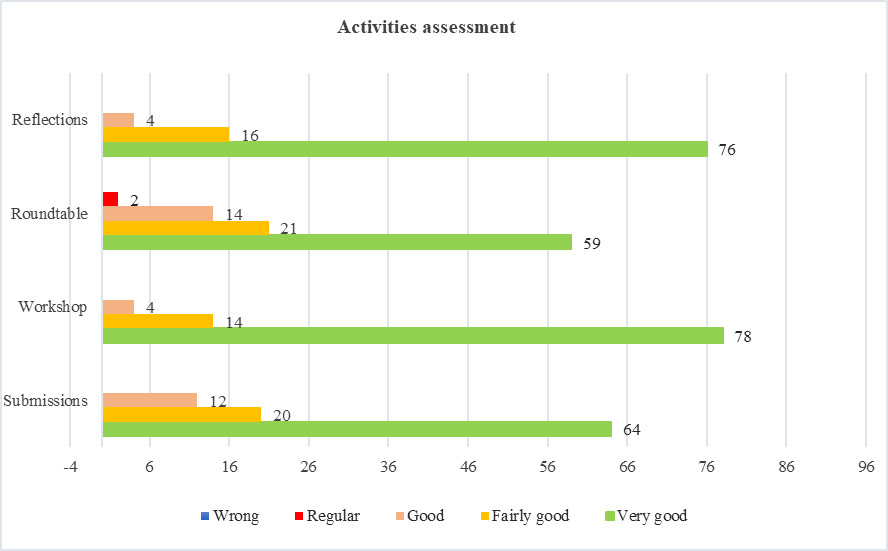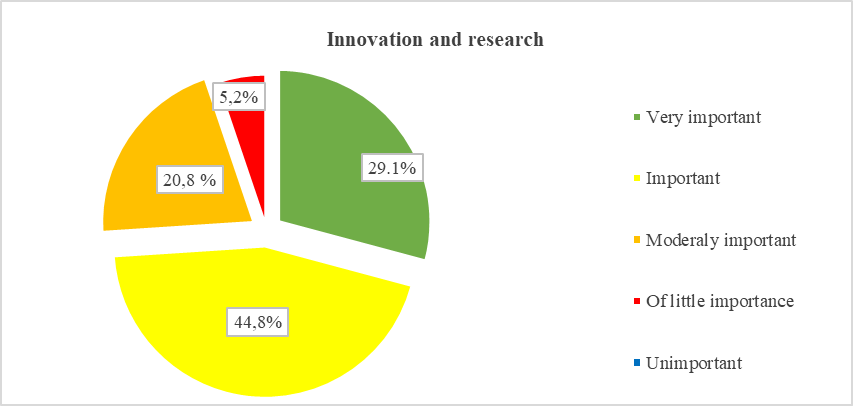Abstract
Our report is based on an innovation proposal that promotes the formation of the music education teachers in the community of Aragon (Spain), as a measure of professional development. The purpose of our study is to boost the development of musical knowledge through a proposal of continuous training that motivates the exchange amongst teachers of different educational stages related to basic education (Pre-school, Primary, Secondary, High School and University) as a measure that promotes motivation, creativity and innovation in the study of the educational possibilities of music in the integral educational development of the student. The methodology of the study considers a dynamic method that alternate quantitative and qualitative analysis, combining the study of information from a descriptive, exploratory and interpretative perspective using primary and secondary sources in the analysis of the information. For it, we design and organize a regional meeting which integrates personal and cooperative work, technical knowledge and musical teaching experiences in the following modalities: submissions, workshops and table round. This experience counts with a maximum of registered teachers, with a total of 102 teachers. The teacher meeting promotes and enhances on musical educational innovation and professional dialogue, at the time that motivates the interest in lifelong learning as a way to improve the formation and teacher training. Educational administration includes this experience in the teacher training programs of the Department of Education, Culture and Sport of the Government of Aragon as a consolidated annual experience.
Keywords: Musical teachinggood practicescontinuous learningteacher trainingtraining meeting
Introduction
Interpretation of music education
Music education should deal with the understanding and the interpretation as elements of an educational model in which the development of knowledge is based in the practical experience of "learning by doing" a methodology that promotes creativity, thinking critic, motivation and learner autonomy. In this model, the perception should correspond to productivity and thoughtful thinking with interpretation, as a means of promotion of the musical experience, both in its social dimension as intrapersonal (Hargreaves, 2002). Therefore, according to Barrett (2007) it is necessary to place the music curriculum as a dynamic and practice social from which to promote the views of teachers as main agents of change in the educational and curricular work, as it is the teacher in his educational exercise who truly knows the need and purpose of its educational intervention.
Multidisciplinary educational approach of the music leads to understand it more as a teaching resource of universal expression of people which transmits and retains the identity, culture and history than as a subject (Pliego, 2002). From a multidisciplinary educational dimension, the musical is one of the seven multiple intelligences of the human being, the teacher should consider in their educational practice (Gardner, 1995), whose work motivates the expressive artistic, creative, emotional, spiritual and cultural development and promotes the learning skills related to the mathematical, linguistic and spatial field of knowledge.
A basic musical, artistic and cultural education should conform to social, technological and economic developments experienced by our society. The multidisciplinary and continuous training of teachers requires a teacher training in according to the characteristics and needs that determine the new educational scenarios of a modern society.
The big difference of the musical cultural education, between regions and countries, influences directly the teaching methodology, the activities and the planning of the classroom (Vicente, Subirats, & Ibarra, 2010). Spain does not have a musical and cultural educational tradition as other countries in Europe such as Poland, Hungary and Czech Republic. For this reason, the teacher apart from teaching how to sing, dance and play instruments, should educate the attitude and the sensitivity of the student to make learning music a significant experience.
Teacher training
The music teacher is the main responsible for the way the student learns. According to Mora (2013), the child learns in perception, emotion, sensation and movement, all of them, related to the sensory field experiences, in which he knows and interprets the real world. The consistency of the students´ learning supposes a teaching challenge determined by the training and the attitude of the teacher. The formation of a musically competent teacher involves an attitude of awareness for music, an auditory training for the understanding of the musical elements of the works, expressive body knowledge and an appropriate level of interpretation and domain vocal and instrumental to create and performance simple musical pieces of different styles (del Barrio, 2018).
According to Jokinen and Valijarvi (2013) lifelong learning is essential for the professional development of teachers. Its development requires a connection between the different educational stages and the initial training of teachers in order to forge the construction of reflective and critical behavior. Depending on Santos Guerra (2010), thought on the teaching practice and the opportunity to share it with your workmates facilitates the understanding of the nature of the teaching task, the explanation of the learning rhythms and conflict resolution. In this way, training arising from the practice to return to it with new attitudes, thinking and decisions adapted as improvement proposals.
Problem Statement
Poor attention of music teacher as an actor able to inform and enrich both initial training and continuous training of basic music education in the community of Aragón is the problem that motivates the development of our work. The demand for actions and strategies that contribute to the improvement of teacher training motivates our interest to carry out a didactic experience that encourages the promotion of lifelong learning as a means for the development of knowledge and the stimulation of motivation, communication, reflection and dialogue among music teachers. We design and organize a regional professional meeting with music teachers of different educational stages, as a first educational experience that attempts to approach teaching exchange, stimulates interest in musical education and the innovation and includes the participation of all teachers responsible for basic musical training.
Research Questions
This work requires further study of the following research questions:
To analyse the current situation of music education in Aragón.
To encourage teacher participation through the promotion of good practices.
To know and share pedagogical, methodological and research procedures to improve musical knowledge and to lay the epistemological foundations of the future of music education.
To promote interaction and reviews among participants as a means of establishing collaborative projects.
To create educational workspaces to foster thinking, teaching practice and innovation.
Purpose of the Study
The main purpose of our study is to boost the development of musical knowledge through a proposal of continuous training that motivates the exchange amongst teachers of different educational stages related to basic education as a measure that promotes motivation, creativity and innovation in the study of the educational possibilities of music in the integral educational development of the student.
Research Methods
This study requires a methodological complementarity (Bisquerra, 2004; Flick, 2004) with a sequential dynamic methods that alternates the quantitative and qualitative analysis (Rodríguez Ruíz, 2005) as a premise that facilitates the development of a flexible design of the research according to the topic of study.
Quantitative phase is based in the use of documentary research that provides information, facilitates the understanding and description of the context of study from a descriptive and exploratory perspective. For the qualitative phase we use elements that bring us closer to the interpretative perspective of the reality of study.
We consider primary and secondary sources of information. This work begins in exploratory way with a review of the proceedings of the training activities of the Juan de Lanuza Teacher´s Centre in Zaragoza in the last five years. This information allows us to analyze the activity and the evolution of the permanent training of music education in the different educational stages in this period.
As a primary information source we have a key player: the responsible advisor of the Teacher´s Centre for the management of training in musical education in the last five years. The technique of collecting information was the interview in depth of semi-structured type.
Other information source used was an evaluation questionnaire of the meeting completed by participants after the event. Its design allowed to analyze the assessment of the degree of suitability of the planned activities and its contributions, the degree of fulfilment of the expectations and the organization of the event.
Triangulation of methods and data obtained from the document review, of the information obtained in the interview, the data of the evaluation questionnaire of the meeting and the interpretation of the own researcher was the criteria of rigor used in our study.
Findings
42 musical activities of training teachers were made in the last 5 years in Zaragoza province, all of them managed by the Juan de Lanuza Teacher´s Centre (Table
54.76% of activities correspond to the training of teachers at conservatories. High school teacher does not any training activities in this Center. There are 2 choral music projects consolidated in elementary education, 6 activities coordinated by the Teacher´s Centre related to these projects and 3 musical training activities carried out in schools by teacher initiative.
Consolidated musical projects focus the participation of Primary teacher. High school teacher does not participate in the face-to-face training. Some of the reasons justifying these data were as follows: (1) The Teacher´s Centre cease to be the focal point for the permanent teacher training given the wide range of existing and the proliferation of new formats such as online training. (2) A restructuring of Teacher´s Centre in 2012/2013 school year affected the redistribution of functions and the disappearance of the specialist advisors who promote specific training transforming the direction of training of teachers. (3) The priority lines of training proposed by the Administration each school determine the training of teachers. Arts education has never been a priority line of training, a fact that demonstrates the low importance of Arts education in comprehensive student education.
Promotion of the social dimension of learning involves communication and the exchange of ideas as a measure of motivation and professional development. The organization of the regional meeting of music teachers in a training day brings together a total of 102 teachers. Professional profile includes teachers of Pre-school, Primary, Secondary, High school, and Conservatory and University professors. In your design, the meeting program consider the active participation and cooperative working in theoretical and practices activities related with music teaching, reflection and discussion in the following modalities: submissions, workshop, round-table debate and a final reflection moment.
Submissions enhanced the value of teaching to show and share studies, projects, methodologies, experiences and innovative teaching resources. 12 submissions were presented by teachers of different stages and contexts (Figure

The
The
Initial training of musical education in the University. Historical review, analysis of the formation of music teacher college student and prospects for the future.
Projection of the musical education and teacher training through the analysis of the implications and the teaching skills as key points in the professional recognition of musical education by the educational community.
High School Performing Arts structure and operation of this study program, as an educational alternative musical of secondary students.
Educational innovation focused on the analysis of the project of integrated music curriculum developed in five schools in the community of Aragon where the child acquires a qualification to continue professional musical training at the Conservatory.
A music teacher of Primary School, two high school teachers, an advisor of Teacher´s Centre from Zaragoza and a University professor participated in the roundtable. The final debate led to the participation and discussion of attendees on the issues discussed. The set of experiences was a vertical understanding of musical and temporary educational work which concern the past, the present and the future of music education at the various educational stages.
The final assessment of the didactic and professional contributions of this meeting was performed with an evaluation questionnaire that was finally answered by a total of 96 participants, whose main results we then analyze.

According to the results obtained from the assessment questionnaire (Figure
Learning analysis of these experiences stimulated interest, motivation, analysis and reflection of the participants as a researcher of your own teaching practice. 73% of respondents said to be willing to take an active part in upcoming meetings.
Practical and dynamic dimension of body percussion workshop was assessed very positively by 81.2% of surveyed (N = 78). Percussion and body expression stimulate the connection between hearing, rhythm, percussion, gesture and movement. His work favors the development of neuromotor and cognitive child, making your teaching considered it fundamental knowledge of active musical pedagogical currents that underlie it such as Carl Orff musical pedagogy.
The Roundtable has integrated the study of educational stages of the music teacher: initial training, teacher training and educational innovation. Initial music training college has gone from a specialized to a more general training. Regarding the professional projection of the music teacher, demanding and vocational dedication, didactic rigor and musical creativity, are traits that favor the respect, the support and recognition of the educational community by the music teacher. Teacher assessment for innovation and research (Figure

Continuous learning involves a personal attitude to improve professionally. This decision requires an interest to read, to take part in courses, to meet new teachers and to create new resources as a way to improve your teaching competence. Continuous training educates the adaptability of the teacher to the new methodologies, according to the advances and necessities of the society. 95.8% of surveyed (N = 92) affirms to deepen the study of some of the experiences presented and integrate them into their educational action. In addition, the exchange of ideas amongst attendants during the meeting has stimulated the contact to undertake new projects in the future.
Eventually, the meeting organization was assessed in an outstanding way for all of the surveyed. Also, the set of participants stated the need to encourage the training meetings as an ideal way to analyze the situation of the musical didactics, to motivate innovation of music teacher, to meet new workmates, to promote the dialogue and the exchange and to improve teaching training and the professional development.
Conclusion
The promotion of musical educational innovation may be reinforced with the organization of educational meetings as a way to improve the
Music didactics involves working
Teaching to learn is an educational work which requires firstly
Educational experiences related to
Professional meeting motivates the particular interest in improving the
Musical experiences in different stages reveal
The excellent response teaching meeting has had as a
Acknowledgments
I would like to express my gratitude to my fellow teachers Begoña Sanmartín, Belén Sagrado and Armando Carmona for providing their comments, suggestions and their invaluable contributions in our coordination meetings to make this project a reality. Also I would like to thank Mr. Luis Ángel Gálvez, Teacher´s Centre advisor, for your availability in interview, your support of this idea and your collaboration in administrative management of this project.
References
- Barrett, J. R. (2007). Currents of change in the music curriculum. International Handbook of Research in Arts Education, 16, 147-177.
- Bisquerra, R. (2004). Metodología de la investigación educativa [Educational research methodology]. Madrid: La Muralla.
- Del Barrio, L. (2018). La competencia didáctica musical en el grado de maestro en educación infantil [Musical didactic competence in Teaching Training Grade in Child Education]. Eufonía, 74, 51-59. Barcelona: Graó.
- Flick, U. (2004). Introducción a la investigación cualitativa [Introduction to Qualitative Research]. Madrid: Morata.
- Gardner, H. (1995). Estructuras de la mente [Frames of Mind]. Barcelona: Paidós Ibérica.
- Hargreaves, D. J. (2002). Infancia y educación artística [Childhood and Artistic Education]. Madrid: Morata.
- Jokinen, H., & Valijarvi, J. (2013). El mentorazgo: una herramienta para apoyar el desarrollo profesional del profesorado [Mentoring a tool to support the professional development of teachers]. In J. Ritva & N. Hannele (Eds.), Aprender de Finlandia. La apuesta por un profesorado investigador (pp.119-134). Bogotá: Editorial Magisterio.
- Mora, F. (2013). Neuroeducación [Neuroeducation]. Madrid: Alianza Editorial.
- Pliego, V. (2002). La formación del maestro especialista en música [Music Teacher Training]. Educación y futuro: revista de investigación aplicada y experiencias educativas 7, 1.
- Rodríguez Ruíz, O. (2005). La Triangulación como Estrategia de Investigación en Ciencias Sociales [Triangulation as a Research Strategy in Social Sciences]. Revista madri+d, 31.
- Santos Guerra, M. A. (2010). La formación del profesorado en las instituciones que aprenden [Teacher Training in the Learning Institutions]. Revista Interuniversitaria de Formación del Profesorado, 24(2), 175-200. Zaragoza: Universidad de Zaragoza.
- Vicente, A., Subirats, M. A., & Ibarra, J. (2010). La formación de los docentes de educación musical en el proceso de adaptación al espacio europeo de educación superior: Polonia, Hungría y la República Checa [The training of music education teachers in the process of adaptation to the European Higher Education Area: Poland, Hungary and the Czech Republic]. Profesorado. Revista de Currículum y Formación de Profesorado, 14(2), 155-170. Granada: Universidad de Granada.
Copyright information

This work is licensed under a Creative Commons Attribution-NonCommercial-NoDerivatives 4.0 International License.
About this article
Publication Date
27 May 2020
Article Doi
eBook ISBN
978-1-80296-083-9
Publisher
European Publisher
Volume
84
Print ISBN (optional)
-
Edition Number
1st Edition
Pages
1-330
Subjects
Teacher training, bullying, child abuse, abusive relationship, neglected child, neglected teenager, cognitive psychology
Cite this article as:
Aranda, L. D. B. (2020). Musical Workspaces For Teachers As A Way To Promote Continous Learning. In C. Salavera, P. Teruel, & J. L. Antoñanzas (Eds.), Observatory for Research and Innovation in Social Sciences, vol 84. European Proceedings of Social and Behavioural Sciences (pp. 180-189). European Publisher. https://doi.org/10.15405/epsbs.2020.05.20
